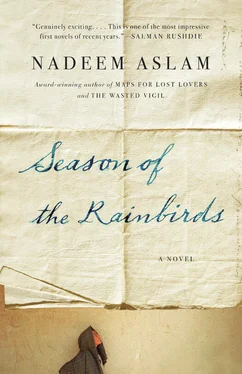‘So do you think Maulana Hafeez would have acted differently?’

A faint, almost imperceptible, breeze was at work. All around them branches were letting go of leaves. Suraya bent down to pick one up, then looked around and through the drizzle of yellow leaves located the small tree growing against the courtyard wall to which the leaf had belonged until only moments ago.
‘Did that apricot ever give any fruit?’ she asked Kalsum. Since there was no electricity they were sitting in the cool of the veranda. Birds sang in their cages — some suspended from the ceiling, others in a line at the edge of the brick floor.
‘You remember,’ Kalsum said, surprised. ‘When your brother-ji bought it he thought it was an apricot tree but as it turned out he’d made a mistake. It is a peach tree. The first year it produced only flowers, no fruit. So we changed its position and the following year it did produce fruit, peaches!’
The garden was fading fast for the coming winter. The grapevine was nothing more now than a tangled mesh of thin branches which looked like rust-covered wire. Years before — from the time she had been widowed until the year of her son’s death — Kalsum would, in early summer, have tiny sacks of cloth tied over the choicest bunches of grapes, to prevent birds from pecking at the fruit. Enough fruit was left, though, for the humming-birds that were so fond of visiting the garden. She had made the sacks by cutting up an old dress.
‘That’ — she pointed at the lubinium — ‘is a cutting we got from Gul-kalam.’ Gul-kalam had brought some saplings from the mountains to plant outside his house and being native to higher altitudes the plant was beginning to turn green. During December and January the whole plant would be smothered in blazing yellow petals.
‘Flowers in winter,’ Suraya said quietly. ‘When I left for England I thought I’d never see flowers again. I hadn’t seen many flowers in winter here and I knew that England was a very cold country.’ And she looked at her sister and said: ‘There are flowers in those countries but you still dream of the place you come from.’
‘It’s easy to dream when your stomach is full,’ Kalsum said. ‘Don’t forget you left this country because you didn’t have anything to eat here. It didn’t seem very pretty then, did it?’
Suraya looked away.
‘I remember just after you were married,’ Kalsum said, ‘Burkat said he’d leave for England soon. Everybody was going in those days. He said he would make lots of money. “It’s a rich country, England is, sister-in-law,” he said.’
Suraya smiled painfully. ‘He ended up in Canada, in a restaurant, washing dishes like a woman.’
‘When he left he said the first thing he was going to do on reaching England was to employ a gora to clean his shoes. It was to be his revenge for the hundred and fifty years of their raj.’
Suraya twirled the yellow leaf in her hand, then she dropped it. She rubbed her fingertips together to dislodge any dirt. Her nails were bitten down to the quick. ‘We didn’t know anything,’ she said. ‘Neither of us.’
Kalsum touched her sister’s arm. ‘Go back to him.’
‘I don’t know what I should do,’ Suraya said under her breath. And she repeated the words louder, as though she herself needed to hear them spoken.

By late afternoon Alice had managed to kill every water lizard in and around the house. The day had been hot and dry and she found most of them in the damp corners of the bathroom or in the moist soil of the flowerbeds. Mr Kasmi had to spend the whole afternoon listening to loud thuds as the broom descended on the witless creatures. Afterwards Alice sprinkled salt on the doorstep and, against Mr Kasmi’s advice, blocked the drainpipes with rags. At five o’clock, when the heat ebbed, she went out to throw the dead creatures into the river.
When the doorbell rang Mr Kasmi, who was searching for a favourite poem in an anthology, clicked his tongue in displeasure and put the book on the table. He went to the open window and looked down on to the street. Maulana Hafeez was standing on the doorstep.
Mr Kasmi waited for a few moments before stepping back. Then, after another brief pause, he crossed the room and went on to the landing. He saw that Zébun was on the courtyard below, excitedly welcoming the cleric into the house.
‘Allah, Maulana-ji,’ Zébun was saying, ‘so you decided at last to bless this house with your presence.’ Maulana Hafeez was smiling absently; he pointed to the doorstep and asked, ‘Is this salt?’ Zébun arranged her stole over her head. ‘The water lizards, Maulana-ji. It’s that girl’s idea.’ She steered Maulana Hafeez towards her bedroom.
Mr Kasmi returned to his room and picked up the book.
Maulana Hafeez had never visited the house before, not once. When word of Zébun’s arrival spread through the town all those years ago, Maulana Hafeez had planned a visit. But before he could find time Zébun herself came to see him. She said she was carrying the child of a man who had promised to marry her but who, in the face of resistance from his wife and family, was now irresolute. Now he would only marry her if the child that she carried turned out to be a girl: the family, she said, could not trust her — a courtesan — with a female child. In the case of a boy she would receive a monthly allowance but there was to be no attempt at direct contact with the father. Zébun was visiting the cleric to ask what observances — special rosaries, specific verses of the Qur’an — could ensure a girl. It was an unusual wish. Women always came asking for a male child, and were told to recite daily the section of the Qur’an concerning Hazrat Ibraheem and his wish in old age for a son — a wish that was granted in Ishak. When the townspeople heard about the unusual wish, their fears were confirmed: only a prostitute would wish for a girl. Evil charms were thrown into Zébun’s courtyard. There were showers of mysterious seeds and pulses, small packets of powder, bottles of liquid that changed colour at the touch, scraps of paper with geometric designs and sequences of inverted numbers; and once a goat’s ear was nailed to the window during the night. For all that the baby, a boy, lived for only a few hours.
Over the years Zébun had continued to visit Maulana Hafeez at his house. Maulana Hafeez was aware of the persecution she had suffered during her earlier years in the town. And he had been forced eventually — when he heard the rumour that Zébun’s bathroom had a looking-glass floor — to include the matter in a Friday sermon. Without direct reference to Zébun he had talked at length about the spirit of tolerance and forbearance. He was understood.
When he heard Maulana Hafeez leave, Mr Kasmi came downstairs. Zébun was sitting inside the mosquito netting.
‘What did Maulana Hafeez want, sister-ji?’
‘They’re thinking about putting up gates at either end of the street,’ Zébun replied. And she explained the matter as best she could. ‘That’s how I understood it,’ she concluded. ‘You’d better ask the men about it, brother-ji.’
‘Such a strange scheme.’
‘Many people seem to have agreed. Dr Sharif, Nasin Hasanie, Majid and Wajid Shafik. And I too think that if it can prevent something like last week then it’s worth the trouble and expense. But as I said, you better ask around; you’re the man of the house, brother-ji.’
Mr Kasmi nodded.
Zébun said, ‘Brother-ji, I hope Maulana Hafeez’s being here didn’t distress you. All these years I have gone to see Maulana-ji at his house, just to prevent him from coming here and maybe reminding you of — no, no, let me finish, brother-ji — but today I couldn’t hide my pleasure at seeing Maulana-ji in the house, even though I knew you were standing watching by the banéra. I now realise that it was a little inappropriate.’
Читать дальше













